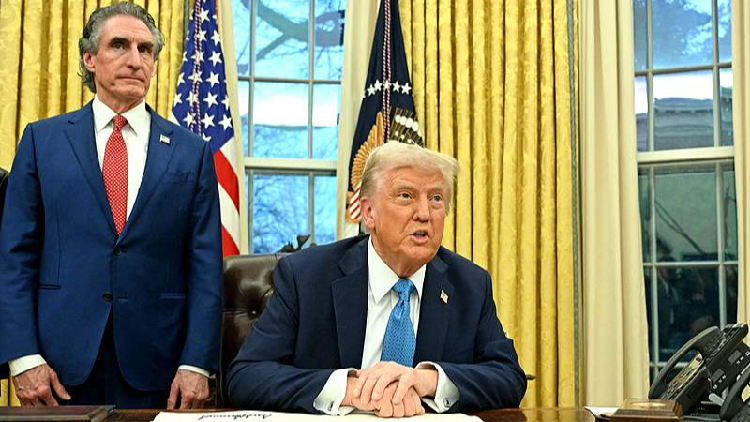Global backlash and worry ignited by U.S. tariff decision
U.S. tariff decision generates global criticism and concern.

He commented, "As the new U.S. administration is swiftly announcing a set of executive orders under the 'America First' policy and actively utilizing tariffs, the government and the private sector should unite their capabilities to efficiently and effectively respond to the possible effect on the country under different scenarios." Cheong emphasized the need to mobilize "all available resources."
Concerns have emerged from the local trade community regarding President Trump’s tariffs on Canada, Mexico, and China, as reported by the Korea Times.
On Saturday, U.S. President Donald Trump directed the implementation of a 25-percent tariff on imports from Mexico and Canada, in addition to a 10-percent tariff on Chinese goods, actions that have garnered global criticism and concern.
The European Commission expressed disapproval of Trump’s tariffs on the three nations, stating they disrupt global trade and negatively affect all parties involved while pledging to retaliate if targeted. "The European Union regrets the U.S. decision to impose tariffs on Canada, Mexico, and China," an EU spokesman noted.
He underscored the significance of "open markets and respect for international trade rules," which are crucial for robust and sustainable economic growth. "Tariffs create unnecessary economic disruption and drive inflation. They are hurtful to all sides," he added.
Germany's Vice Chancellor and Minister of Economics, Robert Habeck, warned on Sunday that the U.S. action represents "a very bad alternative," indicating that Europe would respond with its own measures.
In response to the U.S. tariffs, Mexican President Claudia Sheinbaum instructed the Secretariat of Economy on Saturday to introduce tariff and non-tariff measures to safeguard Mexico's interests. She emphasized on social media that objectives aren’t achieved through tariffs but through dialogue. "We categorically reject the White House's slander against the Mexican government of having alliances with criminal organizations, as well as any intention of intervention in our territory," she stated. Sheinbaum advocated for bilateral cooperation to address drug trafficking and violence under the principles of shared responsibility, mutual trust, collaboration, and respect for sovereignty, "which is not negotiable."
Following the U.S. tariffs, Canada announced retaliatory tariffs on American imports late Saturday. Canadian Prime Minister Justin Trudeau stated that Canada will impose 25-percent tariffs on American goods valued at 30 billion Canadian dollars starting Tuesday. According to Trudeau, additional tariffs will apply to another 125 billion Canadian dollars worth of goods in 21 days. A range of products including American beer, wine, spirits, vegetables, clothing, shoes, perfume, household appliances, furniture, and sports equipment will face the tariffs.
Trudeau noted that further non-tariff trade actions, which may include restrictions on exporting critical minerals and energy products to the U.S. and limitations on American firms bidding on government contracts, are still under consideration.
China also condemned the U.S. decision to impose a 10 percent additional tariff on imports from China. A spokesperson for the Chinese foreign ministry expressed: "China's position is firm and consistent. There is no winner in trade and tariff wars," reiterating that U.S. unilateral tariff increases significantly breach WTO rules and do not resolve domestic issues or provide benefits to either country, or the world at large.
The spokesperson highlighted China’s strong stance against narcotics, stating that the nation has consistently supported the U.S. in addressing issues related to fentanyl.
An expert weighed in on the situation, stating that the second Trump administration regards fentanyl as a serious risk to American society, hoping to resolve domestic challenges through pressure on other nations to enhance enforcement. "However, such unilateral trade coercion violates WTO rules and disciplines, thus constituting the incorrect way to solve the problem," remarked Ji Wenhua, a professor at the University of International Business and Economics in China.
Professor Ji stated that the U.S.’s unilateral tariff actions could have damaging repercussions and suggested that effective solutions to the fentanyl crisis depend on enhanced multilateral cooperation. He cautioned that U.S. unilateralism may provoke backlash from other WTO members, potentially igniting a global trade war, warning that higher tariffs would lead to increased prices for imported goods, ultimately burdening American consumers and diminishing the competitive edge of U.S. companies internationally.
Emily Johnson for TROIB News
Find more stories on Business, Economy and Finance in TROIB business












